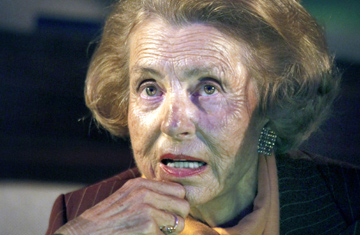
This March 4, 2010 photo shows Liliane Bettencourt, during a press conference at the UNESCO headquarters in Paris.
The soap opera antics of France's dysfunctional World Cup soccer team aren't the only source of drama the French are getting these days. This week the nation watched in amazement as a family feud for control of a multi-billion-dollar fortune collided with tax fraud allegations that indirectly ensnared the wife of one of France's leading cabinet members and which, in turn, sparked charges that the entire affair is a politically motivated scheme to thwart the conservative government's controversial pension reform. Welcome to the latest chapter in the confusing, chaotic story of the fight for the L'Oréal family fortune.
The showdown over the estimated $15 billion belonging to L'Oréal heiress Liliane Bettencourt begins in early July, when a court will hear a case charging that she allowed herself to be bilked out of over $1 billion by a socialite photographer. Daughter Françoise Meyers-Bettencourt is suing François-Marie Banier on claims he played on the elder Bettencourt's frail state for his profit — and, by extension, she hopes to prove her mother should no longer retain control of the family funds.
The saga took its strangest — and most voyeuristically entertaining — turn when online investigative site Mediapart revealed on June 16 that police had obtained tape recordings secretly made over the past several months by a butler who used to work for Bettencourt, ranked by Forbes as the world's richest woman. When Mediapart obtained and published the transcripts of those clandestine tapes on Tuesday, they revealed exchanges between Bettencourt and Patrice de Maistre, head of the family's holding company, that indicated Bettencourt had placed millions of euros into unlisted foreign bank accounts to avoid French taxation. French media reports on Tuesday estimated such accounts hold $100 million in Switzerland alone.
Even more titillating to French readers was the revelation that one of the employees working for that holding company is Florence Woerth. She's married to Labor Minister Eric Woerth, who's responsible for a controversial new government reform of the pension system that will roll back the retirement age two years to 62. Comments that De Maistre made to Bettencourt on the tapes not only suggested that Eric Woerth's influence had been useful in advancing projects the Bettencourt family held dear, but also intimated that such assistance had been the motivation for the family company hiring his wife in the first place.
Woerth insists there was no conflict of interest between his wife's job and his government work. He also furiously denies claims that in his previous post as budget minister, he'd been informed of Bettencourt's foreign accounts and had chosen to ignore them despite his wider crusade against tax fraud. But leftists have pounced on the affair and demanded that the minister resign. Socialist parliamentarian Arnaud Montebourg went beyond charges of conflict of interest to accuse the Woerths of having used their respective jobs "not only in a collusion we find revolting, but for penal infraction" of abetting tax evasion.
Meanwhile, leftists claim that Florence Woerth's position meant she would have known about the illicit foreign accounts — and therefore informed her husband. The couple are threatening multiple legal cases for slander in response. Eric Woerth and other government officials have described the timing and ferocity of the controversy as an effort to derail his pension reform. "There's an extremely troubling coincidence between the appearance in the press of these stolen conversations at the very moment Eric Woerth is leading what's doubtless the most important reform for the government and the future of the French people," said Education Minister Valérie Pécresse on Radio J on June 20. On Tuesday afternoon, Premier François Fillon stepped up to declare his confidence in Woerth and stave off calls for the Labour Minister's resignation.
By then, however, Woerth had already announced that his wife will be quitting her job with the Bettencourt holding company because "she gets along relatively badly with her boss." And Bettencourt had released a statement saying she would carry out "the regularization of all family funds still placed abroad" — phrasing that pundits point to as an acknowledgment that some of the family's holdings break French tax rules.
All of this just adds more drama to the legal clash between Bettencourt and her daughter. In the trial set to start in two weeks, photographer Banier is expected to repeat his earlier denials that he manipulated the elder Bettencourt into lavishing a billion dollars worth of art, cash and gifts — including an entire island — on him as a thanks for being her faithful adviser and confidant. Still, the Mediapart transcripts appear to offer another layer to Meyers-Bettencourt's claims: in conversation with the notary in charge of officializing her legal matters, Bettencourt says she was unaware that she had named Banier as the sole heir to her fortune and readily agrees with the urging that Banier should be removed from her will.
Just as in any good drama, these revelations open up a slew of cliffhanger questions: Will the court accept furtively recorded comments as evidence in the trial against Banier? Will that help Meyers-Bettencourt win her efforts to have Banier stricken from the will and wrest control of the family billions from her mother? Will the person who instructed the butler to tape Bettencourt's conversations ever be revealed? And will Florence Woerth's proximity to alleged tax fraud cost her husband his job? Stay tuned
